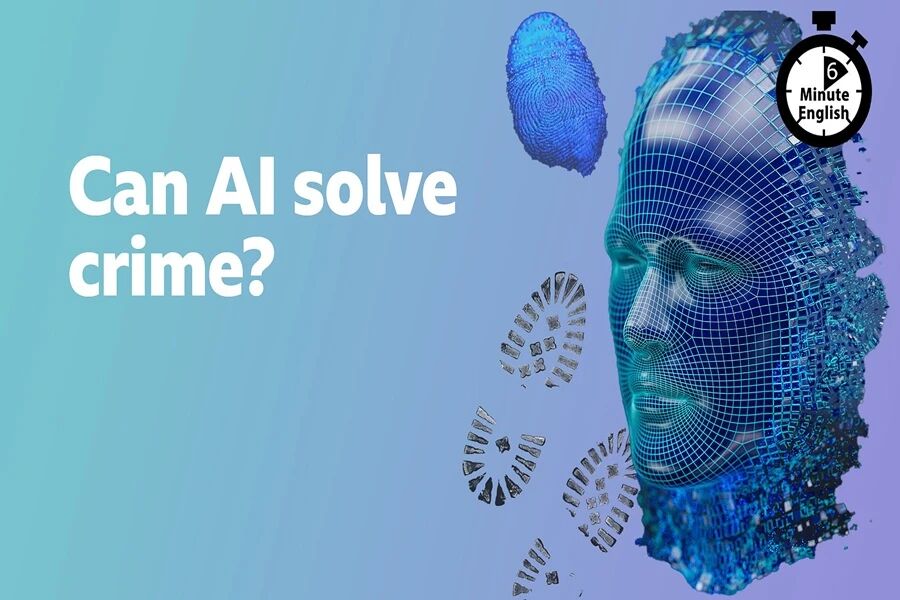
Now today, Neil, we're talking all about solving crime. Do you think you'd be a good detective?
尼尔,今天我们来谈谈破案。 你觉得你能当个好侦探吗?
Actually, no, Beth. I think my brain's not very good with details! Today, we'll be talking about how artificial intelligence might help detectives and the police investigate crimes. But first, I have a question for you, Beth -- in the UK, lots of people enjoy watching fictional detectives on TV. These programmes are called murder mysteries and tell the story of a detective solving a crime. In 2020, a magazine called the Radio Times asked readers who their favourite TV detective was. So, who do you think was the most popular? Was it: a) Sherlock Holmes, b) Hercule Poirot, or c) Miss Marple?
事实上,不能,贝丝。 我觉得我的大脑不太擅长处理细节! 今天,我们将讨论人工智能如何帮助侦探和警察侦查犯罪。 但首先,我有个问题要问你,贝丝——在英国,很多人喜欢看电视上虚构的侦探。 这些节目被称为谋杀悬疑节目,讲述侦探破案的故事。 2020年,一家名为《广播时报》的杂志询问读者其最喜欢的电视侦探是谁。 那么,你认为谁最受欢迎呢? 是:a)夏洛克·福尔摩斯,b)赫尔克里·波洛,还是c)马普尔小姐?
Surely it's Sherlock Holmes?
肯定是夏洛克·福尔摩斯吧?
Well, you sound very sure, but I will reveal the answer at the end of the programme. Now, when the police are investigating crimes in the real world, their techniques are often quite different from what we see on television.
好吧,听起来你很肯定,但我将在节目的最后揭晓答案。 现在,当警察在现实世界中侦查犯罪时,他们的技术往往与我们在电视上看到的大不相同。
Yes. Solving crimes involves collecting and reviewing lots of evidence, like DNA, fingerprints, or CCTV.
是的。 破案涉及收集和审查大量证据,例如DNA、指纹或闭路电视。
All of this work takes a lot of time. So, can AI help police speed up the work and even solve crimes? That's the question listener Alastair had for BBC Radio 4 programme The Artificial Human. And host Aleks Krotoski wanted to know more…
所有这些工作都需要花费大量时间。 那么,人工智能能帮助警察加快工作速度,甚至破案吗? 这是听众阿拉斯泰尔向BBC广播4频道《The Artificial Human》节目提出的问题。 主持人亚历克斯·克罗托斯基想了解更多……
So, Alastair, why are you asking this question? Tell us a little bit more about yourself and where you're coming from?
那么,阿拉斯泰尔,你为什么问出这个问题? 能再多讲讲你自己吗,比如你的背景或立场?
So, my name's Alastair and I'm a serving police officer. My background is with investigation. I'm looking at artificial intelligence and thinking, "What can it do for me?"
我叫阿拉斯泰尔,是一名现役警察。 背景是刑侦调查。 我正在研究人工智能,想着:“它能为我做什么?”
Alex asks Alastair to explain where he's coming from. This means explain his perspective or point of view. In informal English, we'll often ask someone, "Do you get where I'm coming from?" And we're asking whether they understand our opinion or perspective.
亚历克斯让阿拉斯泰尔解释他的立场。 这是指说明他的观点或角度。 在非正式英语中,我们常会问别人:“你明白我的意思吗?” 这其实是在询问对方是否理解我们的意见或立场。
Alastair explains that he's interested in how artificial intelligence could help solve crimes, because he's a police officer with a background in investigations. If you have a background in something, it means most of your previous work or experience was related to something. For example, I work as a producer at BBC Learning English now, making programmes, but my background is in classroom teaching.
阿拉斯泰尔解释说,他对人工智能如何帮助破案感兴趣, 因为他是一名警察,有侦查案件方面的背景。 如果你有某些方面的背景,这意味着你之前的大部分工作或经验都与此有关。 例如,我现在是BBC教学英语的制片人——制作节目,但我的背景是课堂教学。
Alastair talks about using artificial intelligence for training and asks, "What can it do for me?" This means, "How can artificial intelligence help or improve something?"
阿拉斯泰尔谈到使用人工智能进行训练,并问道:“它能为我做什么?” 这是指,“人工智能如何帮助或改善某事物?”
When a crime happens, police officers have to collect and review a lot of information to find evidence. When you have a lot of information to review, it can be difficult to know what's important and find patterns which might be relevant to the crime.
当犯罪发生时,警察必须收集和审查大量信息才能找到证据。 当你有大量信息要审查时,你很难知道什么是重要信息,也很难找到可能与该起犯罪有关的证据模式。
But Professor Ruth Morgan, an expert in crime and forensic science, thinks AI could help speed up police work, as she told BBC Radio 4s The Artificial Human.
但犯罪和法医学专家露丝·摩根教授认 为,人工智能可以帮助加快警方的工作速度, 正如她向BBC广播4频道《The Artificial Human》所讲述的那样。
I think we're seeing a renaissance in the pattern-recognition forms of evidence, so finger marks, footwear marks. There's been lots of challenges with those forms of evidence over the last ten years, probably going a little bit out of favour. And yet what we're beginning to see now with AI is that you can take a photo of a mark with your phone, compare that mark to the database and get real-time insight.
我认为我们正在看到证据的模式识别形式的复兴,比如指纹,鞋印。 在过去的十年里,这些证据形式面临着很多挑战,可能有点不受青睐。 然而,我们现在开始看到的是,通过人工智能,你可以用手机拍摄一个痕迹照片, 将其与数据库进行比较并获得实时洞察。
Ruth says that there is a renaissance in looking at patterns in evidence, such as finger marks or footwear marks. Renaissance means new interest or activity in a particular topic or area.
露丝说,如今在审视诸如指纹或鞋印之类的证据模式方面正迎来一场复兴。 复兴指的是在某一领域或主题重新兴起的热潮或活动。
This kind of evidence went a little bit out of favour over recent years because of the excitement around DNA evidence. If something is out of favour, it is less popular or appealing.
近年来,由于DNA证据带来的轰动效应,此类证据有点不受青睐。 如果某物不受青睐,那么它就不那么受欢迎或不太有吸引力。
But AI could mean that patterns in finger marks or footwear marks are useful in solving crimes again. This is because AI can be used to compare a picture of a mark with a database of pictures from other crimes and get real-time insight. The adjective real-time means the information is presented at the same time that it's happening.
但人工智能可能意味着指纹或鞋印的模式在破案方面再次发挥作用。 这是因为人工智能可以用于将标记的照片与其他犯罪的图片数据库进行比较,并获得实时洞察。 形容词“实时的”是指信息在其发生的同时就呈现出来。
Yes, AI can compare lots of information very quickly, which makes finding patterns in evidence much easier and more reliable.
是的,人工智能能够极快地比对海量信息,这使得从证据中发现规律变得更加高效可靠。
There are some problems with using AI to solve crimes though.
不过,使用人工智能破案也存在一些问题。
To find these patterns, lots of private information would need to be collected, and police usually have to give clear reasons why they need access to certain information in their investigations.
为了找到这些模式,需要收集大量的私人信息, 警方通常必须给出他们在调查中需要获取某些信息的明确理由。
It's unlikely an AI-powered robot would ever replace a detective anytime soon!
人工智能机器人不太可能很快取代侦探!
Yes, and that reminds me of your question, Neil. I said that Sherlock Holmes was maybe the most popular detective. Was I right?
是的,这让我想起了你的问题,尼尔。 我说夏洛克·福尔摩斯可能是最受欢迎的侦探。 我的回答正确吗?
You were absolutely right. OK. Let's recap the vocabulary we've learned, starting with the expression where you're coming from, which means your opinion or perspective on something.
你的回答完全正确。 好的。 让我们回顾一下我们学到的词汇,从表达“某人的观点或立场”开始,意思是你对某事的观点或见解。
Your background is the area that you have the most work experience in.
你的背景是你工作经验最多的领域。
The question 'what can this do for me?' means 'how can this help or improve things?'
‘这能为我做什么?’这个问题是指‘这如何帮助或改善现状?’
Renaissance means new interest or activity in something.
复兴是指对某事产生的新兴趣或活动。
If something is out of favour, it has become less popular or appealing.
如果某事物不受青睐,它就变得不那么受欢迎或吸引人了。
And the adjective real-time means information is presented as it is happening.
形容词“实时的”是指信息在其发生时就被呈现出来。
Once again, our six minutes are up. Bye for now!
我们六分钟的时间又要结束了。 现在说再见了!
Bye!
拜!
|
|
 /1
/1 